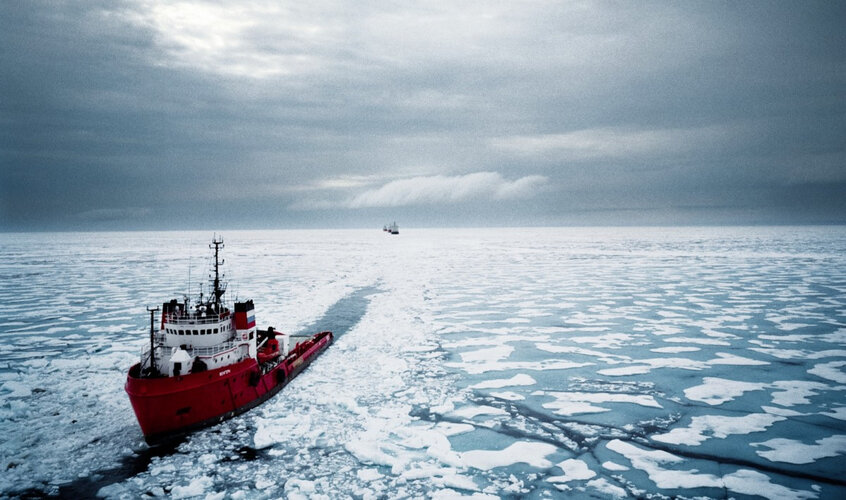Although crossing the polar waters will only be possible with the most modern icebreakers, reducing travel time and providing safety of the transit route is an issue over which China is emphasizing. In September 2010, the Barnes Nordic, as the first merchant ship with an iron ore cargo, sailed directly to Lianyungang, China, via the Arctic Silk Road through the Norwegian port of Kirkenes and the Bering Strait. Of course, it should be noted that most Arctic routes have poor infrastructure, for using which a lot of money should be spent.
China is interested in developing its own Belt-Road Initiative on the polar route. Thus, in 2017, China’s first research vessel set sailing on three main Arctic transportation routes: the Northwest Passage, the Northeast Passage, and the Arctic Route. Also in 2018, the China Remote Sensing Institute signed an agreement with the Finnish Arctic Space Center to establish a monitoring and research center on the polar region. Located in the northern Finnish city of Sodankylä, the center collects processes and shares satellite data and provides an international research platform to support climatic research, environmental monitoring and Arctic navigation.
The center, while helping to design China’s Digital Silk Road (BeiDou Navigation Satellite System), which aims at creating a spatial information system for areas covered by the Belt-Road project, could be an effective support for promoting projects of the Chinese Academy of Sciences aimed at recognizing most climate changes.
On the other hand, the reconstruction of the port of Kirkenes and construction of railway in Rovaniemi, Finland, and an air supply center in Helsinki connected to the proposed Helsinki-Tallinn tunnel are on the agenda, as the city of Rovaniemi connects to the port of Kirkenes on the Arctic Silk Road.
In this regard, ships can enter the port of Kirkenes, where the cargo reaches the railways, and travel to south through Helsinki, then through the Helsinki-Tallinn tunnel to Estonia and finally to Central Europe. Therefore, large Chinese companies, including Alibaba, Huawei, etc., negotiated with their Estonian counterparts on the proposed Helsinki-Tallinn tunnel to prepare Estonia as a center for the exchange of Chinese goods, as well as to build the largest science park in Estonia (also in the Baltic region) for which cooperation agreement was signed.
In February 2018, the final report on the feasibility study of the Helsinki-Tallinn transport route, the 103 km Ada tunnel that connects Finland to Estonia via the Gulf of Finland and is the longest submarine tunnel in the world (250m below the sea level), was published with technical details and will become operational with a cost of 13-20 billion euro, including two large artificial islands.
The tunnel runs parallel to the planned air route through which other parts of Finland, Sweden and northern Russia can be connected. Therefore, it seems that Helsinki will become the air hub of the Arctic Corridor in the future. China’s Ministry of Industry and Information Technology – one of China’s largest telecommunications operators – is also working with Finnish, Russian, Japanese and Norwegian partners to complete the fiber-optic offshore cable connection in the region.
For China, the Arctic Corridor is a tremendous opportunity for cooperation within the framework of the Arctic Silk Road. Clearly, the construction of the Arctic Corridor infrastructure, which is closely linked to the Arctic Silk Road, will facilitate communication between East Asia and the Arctic and help the Baltic region and the Central European market. Since the Arctic Corridor is a huge collection of costly projects, Chinese investment seems to be welcomed by the Arctic countries, as some Chinese companies have received invitations to discuss the possibility of participating in those projects, and the brochure was prepared in Chinese.
Meanwhile, air travel from China to Finland has grown significantly over the past decade. Prior to the Covid-19 pandemic, the Fan Air airlines operated 38 weekly flights to seven Chinese cities. It is noteworthy that passengers traveling to China by scheduled flights from Helsinki accounted for 5% of the total passengers of international traffic, making China the eighth most popular destination for the Finns. Between 2016 and 2017, the number of Chinese visitors increased by 63%. The number of Chinese living in Finland increased from 98,100 in 2007 to 361,800 in 2017. Chinese tourists spent 335 million euro in Finland in 2017, a 49% increase over 2016, or 600 euro per visitor. However, with the outbreak of the Covid-19 pandemic in late 2019, this rate has decreased significantly. With such interpretations, China seems to be pursuing the following goals by establishing a polar silk road and expanding relations and cooperation with countries in the polar region, including Finland:
- Maintaining stability and gaining strategic advantages from competing powers with socio-economic development;
- Adjusting intercontinental unity in order not to weaken the stable system of trade and promote economic-commercial investments by using multilateral relations and agreements;
- Promoting a governance model commensurate with the geopolitical factors of the countries participating in the Arctic economic and trade projects in favor of China’s transregional interests;
- Policies of balance of power and military deterrence for political-security influence in the Arctic and eventually in northern Europe.










0 Comments